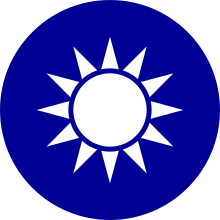Ministry of the Interior (Republic of China)
|
內政部 Nèizhèngbù | |
 | |
| Agency overview | |
|---|---|
| Jurisdiction |
|
| Headquarters | Zhongzheng, Taipei |
| Ministers responsible |
Chen Wei-zen, Minister Lin Tzu-ling[1], Administrative Deputy Minister[2] Chen Chwen-jing, Political Deputy Minister[3] |
| Parent agency | Executive Yuan |
| Website | www.moi.gov.tw |
The Ministry of the Interior of the Republic of China (MOI; Chinese: 中華民國內政部; pinyin: Zhōnghuá Mínguó Nèizhèngbù) is a cabinet level policy-making body, governed under the Executive Yuan of the Republic of China. The fundamental purpose executive yuan agency responsible for home affairs and security throughout Taiwan. The responsibilities include population, land, construction, military service administration, national emergency services, local administration systems, law enforcement and social welfare (prior to 23 July 2013).[4]
Core Functions
It closely monitors the rights of the residents and every aspect of national development. To speed up the progress of the Nation, strengthen social peace and order, and upgrade the quality of citizen's lives.
The Ministry strives to achieve the following:[5]
- Accomplish government reform to boost government vitality;
- Care for the minorities;
- Promote a fair military service system;
- Implement pragmatic growth management to promote sustainable development;
- Reinforce police administration reform;
- Strengthen crisis management to build a comprehensive disaster prevention system;
- Manage the goals to rebuild the Nation into a beautiful hometown;
- Implement walk-around management and close planning/control
Duties
In accordance to the Ministry of Interior Organization Act, the Ministry is charged with the following:
- National internal affairs administration.
- The Ministry bears the responsibilities to direct and monitor the highest-ranking local officials in the execution of tasks charged by the Ministry.
- For direct administration affairs, the Ministry is charged with the authority to order or take disciplinary actions against the highest-ranking local officials. When an official is suspected of conducting illegal acts or overstepping his/her authority, this local official may be suspended or removed pending a resolution from an Executive Yuan meeting.
Administrative divisions
Department structure
The Ministry is currently organized into five departments, one office, four sections, six committees, and one center to share the responsibilities.
- Department of Civil Affairs: in charge of local administration, local self-governing, border administration, public properties, political organizations, elections, religions, rites, funeral, rituals, and ceremonies, historical site investigation, maintenance, and registration, and other civil affairs.
- Department of Population: in charge of household registration administration, nationality administration, population policies, census, national identification cards, name-usage and registration, migration planning, and other population affairs.
- Department of Social Affairs: in charge of social welfare, social insurance, social aid, community development, social service, handicap rehabilitation, non-governmental organization, social movements, cooperative operations, and other social administration affairs.
Furthermore, the Ministry is also set up with sixteen social administration units and two land administration units, which are directly under the management of the Ministry as second level agencies.
Administrative agencies under the Ministry of Interior
- National Police Agency
- Construction and Planning Agency
- National Fire Agency
- National Conscription Agency
- Central Police University
- Architecture and Building Research Institute
- National Airborne Service Corps
- National Immigration Agency
- National Land Surveying and Mapping Center
- Land Consolidation Engineering Bureau
Ministers
- Chang Feng-hsu (1976–1978)
- Chiu Chuang-huan (1978–1981)
- Lin Yang-kang (1981–1984)
- Wu Po-hsiung (1984–1988)
- Hsu Shui-teh (1988–1991)
- Wu Po-hsiung (1991–1994)
- Huang Kun-huei (1994–1996)
- Lin Fong-cheng (1996–1997)
- Yeh Chin-fong (1997–1998)
- Huang Chu-wen (1998–2000)
- Chang Po-ya (2000–2002)
- Yu Cheng-hsien (2002–2004)
- Su Chia-chyuan (2004–2006)
- Lee I-yang (2006–2008)
- Liao Liou-yi (2008–2009)
- Jiang Yi-huah (2009–2012)
- Lee Hong-yuan (2012–2014)
- Chen Wei-zen (2014–)
Transportation
The MOI building is accessible by NTU Hospital Station of the Taipei Metro on the Red Line.
See also
| Wikimedia Commons has media related to Ministry of the Interior (Republic of China). |
- Republic of China
- Cabinet (government)
References
- ↑ "Premier reaffirms target for boosting sewage drainage". Taipei Times. 2014-04-30. Retrieved 2014-05-07.
- ↑ "國土資訊系統-標準制度網站 - Standards Working Group". Standards.moi.gov.tw. Retrieved 2014-05-07.
- ↑ "New Cabinet deputies named(行政院全球資訊網 - PDA(英文版)-Press Releases)". Ey.gov.tw. Retrieved 2014-05-07.
- ↑ http://www.moi.gov.tw/english/foreword.aspx
- ↑ http://www.moi.gov.tw/english/foreword.aspx
| |||||||||||||||||||||||||||||




